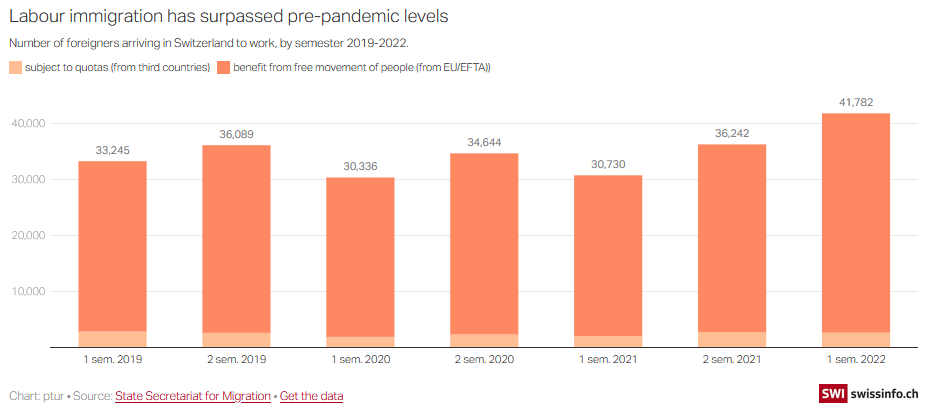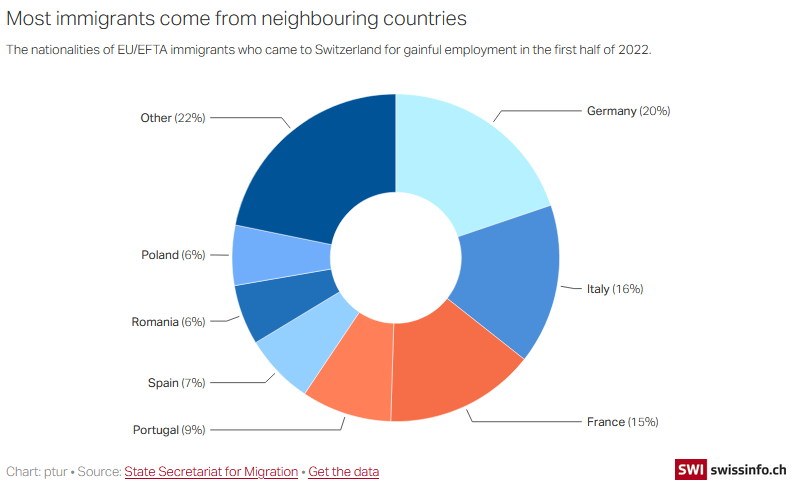Switzerland has returned as a popular destination for foreigners looking for work after two years of Covid-19 restrictions. Over 75,000 people have immigrated to Switzerland so far in 2022, driven largely by an economic boom and unemployment levels falling to a 20-year low. Alexander Thoele began working for SWI swissinfo.ch in 2002. He is of German and Brazilian origin. He was born in Rio de Janeiro and completed studies in journalism and computer science in Brasilia and Stuttgart. More from this author | Portuguese DepartmenAlexander Thoele On March 16, 2020, the almost surreal image of sealed-off Swiss borders marked a sudden break with what had been taken for granted for so long: freedom of movement in Europe. But two-and-a-half years later, the
Topics:
Swissinfo considers the following as important: 3.) Swissinfo Business and Economy, 3) Swiss Markets and News, Featured, newsletter, Work
This could be interesting, too:
Nachrichten Ticker - www.finanzen.ch writes Die Performance der Kryptowährungen in KW 9: Das hat sich bei Bitcoin, Ether & Co. getan
Nachrichten Ticker - www.finanzen.ch writes Wer verbirgt sich hinter der Ethereum-Technologie?
Martin Hartmann writes Eine Analyse nach den Lehren von Milton Friedman
Marc Chandler writes March 2025 Monthly
Switzerland has returned as a popular destination for foreigners looking for work after two years of Covid-19 restrictions. Over 75,000 people have immigrated to Switzerland so far in 2022, driven largely by an economic boom and unemployment levels falling to a 20-year low.
On March 16, 2020, the almost surreal image of sealed-off Swiss borders marked a sudden break with what had been taken for granted for so long: freedom of movement in Europe.
But two-and-a-half years later, the borders are back open, the economy is back on its feet, and immigration is back on the rise. According to the latest figures from the State Secretariat for Migration (SEM), 75,098 people arrived in Switzerland in the first half of 2022 – a 21% increase on the same period in 2021.
| The net migration rate during this period – the difference between the number of immigrants and number of emigrants – was 37,816. And the major driver was work: almost 42,000 people came to Switzerland for a job during the period, even more than in pre-pandemic times.
Meanwhile, according to the State Secretariat for Economic Affairs (SECO), unemployment rates reached a 20-year low of 2% in June 2022, while the number of jobs on offer in the first quarter of the year was the highest since records began in 2003. |
|
Germany, Italy, FranceThe majority of new arrivals to Switzerland came from neighbouring countries, notably Germany (20%), Italy (16%) and France (15%). Portugal (9%), Spain (7%) and Romania (6%) were also significant sources. In total, the number of workers from European Union (EU) and European Free Trade Area (EFTA) countries increased by 11,526 on the same period in 2021. Cross-border workers – who receive a permit to work in Switzerland while continuing to live in a neighbouring country – also rose by 6%, from 408,447 in July 2021 to 433,379 in July this year. And people working on short-term permits (usually for less than a year) rose from 116,924 to 155,329. Meanwhile, figures recently published by the Federal Statistical Office (FSO) showed that the overall population in Switzerland had risen by 0.8% to 8,738,800 people by the end of 2021 – of these, 25.7% did not have Swiss nationality. |
Immigrants are happy in Switzerland
In order to better understand the situation of migrants, the “NCCR – on the move” research project run by the University of Geneva has been periodically conducting surveys since 2014. For its third edition, published in July 2021, it received feedback from 7,393 foreigners on their migrant experience, their work, social and family situation, and their connection to their homeland.
The results give a picture of how these immigrants perceive life in Switzerland as well as – with the questionnaire sent out in 2020 – an idea of how they adapted to the restrictions around the Covid-19 pandemic.
The results were largely positive: despite the difficult economic situation at the time, just 5% of respondents said they had lost their job due to the pandemic. Rather, a large majority (77%) said Switzerland was the “right place” to be during such an unstable period. Over 80% said their professional situation had improved relative to before they came to Switzerland.
Highly qualified
“Switzerland is one of the most attractive countries in Europe for migrants looking for work,” says Philippe Wanner, research coordinator and a professor at the Institute for Demographics and Socio-Economics at the University of Geneva. He says the immigrants surveyed were “successful in a [Swiss] job market which is competitive, but which offers salaries higher than the European average”.
There have however been changes in the profiles of immigrants. Compared to the first survey done by the project in 2014, immigrants with a higher-level qualification have risen from 51.2% to just under 60% of the total. In the past, “migrants from Germany, France, and Italy, in particular, had more basic qualifications,” says Wanner.
As such, there is a downward trend in the number of migrant workers with intermediate levels of education. Wanner says “the Swiss job market doesn’t have a high need for this type of workforce, since the professional training system here already functions very well”.
The next edition of the “NCCR – on the move” survey, financed by the Swiss National Science Foundation, will be published in spring 2023.
Tags: Featured,newsletter,Work



